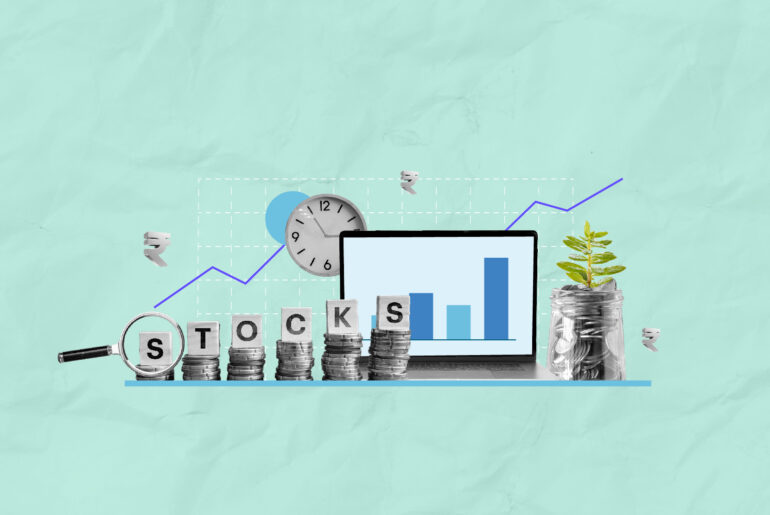Last Updated on Jan 2, 2023 by Aradhana Gotur
When a company needs to raise funds for its operations or growth, there are different sources of financing available to it. Equity shares are one such source of finance that allows companies to raise capital from investors willing to invest in them. But do you know what equity shares mean? Let’s understand here.
This article covers:
- Equity shares meaning – what are equity shares?
- Why do companies issue equity shares?
- Why do investors buy equity shares?
- Types of equity shares
- Features of equity shares
- How do equity shares work?
- How to make money by investing in equity shares?
- Limitations and risks of equity shares
Table of Contents
Equity shares meaning -what are equity shares?
Equity shares, also commonly called stocks, are a source of long-term finance for a company. A company issues equity shares to investors in exchange for a part of its ownership. If you invest in the equity share of a company, you own a part of the company and, as such, you get voting rights in the company’s management. Also, the profits earned by the company are distributed among its equity shareholders in the form of dividends.
Why do companies issue equity shares?
Companies issue equity shares for the following reasons:
- To raise capital: This is the primary reason for the issuance of equity shares. If the company needs funds for mergers and acquisitions, expansion, paying off its debts, or for other reasons, issuing equity shares is the most cost-effective way of raising finance.
- Better than debt financing: Debt includes interest payments which is a cost for the company. In case of equity shares, companies distribute dividends and that too only when they earn profits. As such, equity is a better alternative than debt.
- To gain visibility: Companies issuing equity shares are listed on stock exchanges. This gives them market visibility and also helps them build their market value.
Why do investors buy equity shares?
Investors who know what are equity shares know that they are lucrative avenues of investment because:
- They are highly liquid
- They have a high return potential
- They promise ownership in a company
- They allow investors to participate in the growth of a company
- They can act as a hedge against inflation
- They help in portfolio diversification
So, if investors believe in a company and its profitability, they invest in its equity shares to own a part of the company and to generate attractive returns from the company’s growth.
Types of equity shares
There are different types of equity shares:
| Type of equity share | Brief description |
| Authorized share capital | The maximum number of equity shares that the company is authorized to issue |
| Issued share capital | The number of equity shares that the company has issued |
| Subscribed shares capital | The number of shares which have been subscribed to by investors |
| Paid-up share capital | The portion of share capital for which investors have paid |
| Rights share | Preferential equity shares offered to the existing shareholders at a rate lower than the market value |
| Bonus share | Additional shares issued by the company to its existing shareholders, usually, in the place of dividends |
| Sweat equity shares | Shares issued to employees of the company for their hard work |
| Voting or non-voting shares | Usually, equity shares provide voting rights to investors and are called voting shares. However, in some cases, voting rights might not be offered and such shares are called non-voting shares |
Equity shares are also classified based on the investment style. They are:
| Type of equity share | Brief description |
| Dividend stocks | Shares that pay a dividend |
| Growth stocks | Shares that reinvest the dividend in the business for growth |
| Value stocks | Shares of companies whose market value is lower but the company’s intrinsic value is high due to strong fundamentals |
Features of equity shares
You know what is an equity share but do you know the characterizing features that set it apart from other investment avenues? If you don’t, have a look:
- They are traded on stock exchanges
- By investing in equity shares you invest in a company. You are eligible to receive dividends if the company makes a profit. Moreover, if the market value of the company grows, the value of the share grows and you can earn profits by selling the share
- Returns earned from selling equity shares are taxed as capital gains. The gains earned from selling shares after 12 mth are called long term capital gains. Such gains are tax-free up to Rs 1 lakh. Excess gains, however, are taxed at 10%. Alternatively, if you sell the shares within 12 mth, you earn short term capital gains. Such gains are taxed at 15%
- There is no maturity date. Equity shares are perpetually owned till the company winds up business
How do equity shares work?
Now that you know equity shares meaning, let’s look at how these shares work. When a company issues equity shares to the common public, it lists itself on the stock market and becomes a publicly-traded company. After the initial subscription through an initial public offering (IPO), the shares are listed on stock exchanges. You can buy and sell shares on the stock exchange. The price of equity shares works on the concept of demand and supply among other factors.
- If demand is higher than supply, the equity share price rises
- If demand is lower than supply, the equity share price falls
Investors speculate on the movement of share prices when they trade on the stock exchange. When the company winds up business, the assets of the company are used to pay the equity shareholders after all other debts of the company are paid off.
How to make money by investing in equity shares?
If you know equity share meaning, you can earn attractive returns by investing in it. You just need to pick the right stocks at the right time and then sell them at a better price to earn a profit. Here are some tips and tricks on how you can do that:
- Understand the stock market and how it works. Know the inherent risks of investing in equity. While equity can give returns, it can result in considerable losses too.
- Study a company’s growth potential before you invest in it
- Choose quality stocks that would give appreciation to your investment
- Be patient in a bear market. The market always pulls itself up. You just need to give it time.
- Have a long term perspective if you want to earn from equity
Limitations and risks of equity share
Though profitable, equity shares have their fair share of limitations and risks too. Have a look:
- They are risky and very prone to market volatility. If the market falls, share values can drop and you might end up losing your investment too
- The dividends are not guaranteed and depend on the company’s profitability
- When the company winds up, equity shareholders are the last recipients of the company’s assets. If the company does not have sufficient assets, equity shareholders stand to lose out on their investments
Equity can be a good addition to your portfolio for diversification and it can help you earn good returns too. However, before you invest, understand what is an equity share, how it works, the possible risks and limitations. Choose quality stocks and invest only your surplus savings. Gain experience in equity investing before you commit a larger part of your investments to equity. Make an informed choice so that your investment does what it is meant to do , which is yield good returns.
- How To Analyse Stocks: Identifying Fundamentally Strong Companies - Nov 20, 2024
- Best ETFs in India: NSE ETF Lists of Gold, Debt & Equity ETFs (2024) - Nov 7, 2024
- Best Gold ETFs in India With Expense Ratio - Oct 29, 2024




